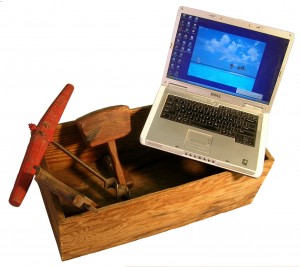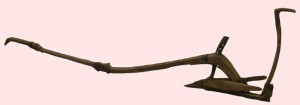Toolbox
 Using what we have ‘to do what we can, where we are…’
Using what we have ‘to do what we can, where we are…’
Many who called the Plains home for most of the past 12,000 years had only the simplest of tools to work with, yet often not only survived but thrived in this unforgiving environment. Nearly a thousand years ago, for example, an unusually large Native American village existed near present-day Albion. Villagers traded with people hundreds of miles away. Yet all its inhabitants had to build with were bone, wood, clay and stone carried here on foot from far away.
Early white settlers had it only a little better. Pictured below is a crude, hand-carved wooden cultivator, needed to remove weeds from between rows of corn. It was built from scratch because a manufactured cultivator couldn’t be had. With simple tools like this those early settlers transformed the land.
The modern pioneer, by contrast, has access to tools never before known to mankind. Computers and the Internet, providing connection to resources and markets, have taken their place alongside shovel and saw in the modern pioneer’s toolbox.
Yet the wooden cultivator, as primitive as it is, is a remarkable device. Its maker was obviously poor, but he compensated for this with remarkable ingenuity, using a few rough pieces of wood to fashion an implement and save his crop. He showed creativity figuring out how to use such crude materials and skill in building it successfully. He demonstrated the pioneers’ fabled self-reliance; if he could have borrowed a cultivator from a neighbor, he surely would have rather than stake his future on such a cobbled-together device. Neighbors must have been either too far away or just as poor.
Most of all, the forgotten maker of this crude implement showed how dedicated he was to his chosen way of life. How many people would go to so much work to try to save a few acres of corn? How many would go to so much work to save a tenuous dream of building a new life on the windswept Plains? Because that’s what the man who built this cultivator was doing, and his efforts are an important reminder that the most important tools in every pioneer’s kit are the ones that can’t be seen.
Though no progress can be made without the tools of the hand, the best-stocked toolbox in the world is of no use without the tools we all carry inside – vision, creativity, the ability to work together, and faith that a better tomorrow is there to be built. Those universal tools have sustained every individual who lived on the Plains before us, both Native and White, and are still essential to the modern pioneer today.
Boone County Tool Kit Saxony-Anhalt Approach New pages for this section are currently under development
